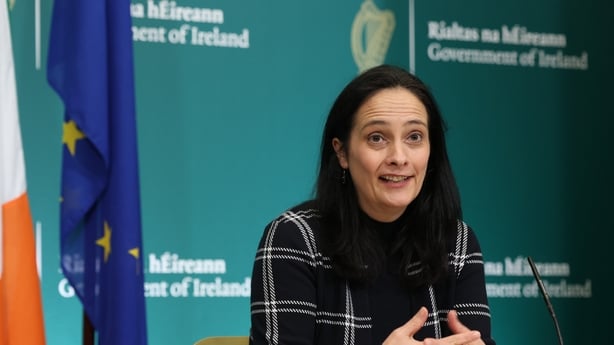The minister responsible for tourism has said she will seek a further extension of the 9% VAT rate for the tourism and hospitality sector in Ireland.
The current reduced rate is due to expire on 28 February and revert to the higher rate of 13.5% from 1 March.
Minister for Tourism, Culture, Arts, Gaeltacht, Sport and Media Catherine Martin said today that no decision on changes to the VAT rate for the sector have been made by Government.
"I've always said that should remain under review, and we take stock of where the industry is, and that is something Government will look at, will assess. No decision has been made on that yet", she said.
The minister said it was "no secret" she sought the retention of the 9% rate in the 2023 Budget and "will continue to seek it".
Ms Martin said she has always stood by the tourism industry, which she said supports 325,000 jobs on the island, generating €6 billion pre-pandemic.
"I think we have to think about that and what that means to our rural communities and in our regions when it comes to an employment point of view", she said.

Earlier, the Irish SME Association (ISME) renewed calls for an extension to the 9% VAT rate to the whole services sector, saying the reduced rate benefits both employment and social contributions.
Neil McDonnell, the chief executive of ISME, said there is very wide support for fixing Ireland's reduced VAT rate at 9% across the services sector.
"Such a measure would be good for employment, good for consumers, and best of all for the Exchequer who would reap the benefits of higher employment levels, income taxes and social contributions," he said.
"This is not economic theory; it is established fact," he added.
ISME said that both Ireland’s standard and reduced VAT rates are high by EU standards and the standard rate is sixth highest in the EU while the reduced rate is fourth highest.
According to Eurostat, Irish consumers pay 36% more than the euro zone average for consumer goods and services.
Only Norway, Iceland and Switzerland, all non-EU members, have higher consumer prices in Europe as a whole.
ISME noted that the standard VAT rate here hit a low of 16.37% in 1972 and reached a high of 35% from 1983 to 1984. The reduced rate ranged from 5.26% in 1972 to 23% from 1983 to 1984.
The reduced rate of 9% was introduced in July 2011 during the recession.
ISME said that while the Department of Finance appears keen to eliminate the 9% rate as an anomaly introduced in the recession, no such enthusiasm is apparent on reducing the 23% VAT rate.
This is despite the fact that Ireland had a standard rate of VAT of 21% for the 21 years from 1991 to 2012.
"With a significant element of core inflation likely to continue in Ireland in 2023, and possibly into 2024, Government should be looking at ways to push down consumer prices, not drive them up," Mr McDonnell said.
"Not alone should the 9% rate for hospitality be permanently extended, we should lower our reduced rate from 13.5% to 9% for all services, including grooming services and housing. At this rate, our reduced rate would be in line with EU norms. We should also permanently reduce our 23% VAT rate to our historical 21%," he added.
The ISME chief said that as a peripheral island economy with no EU border, we should aspire to lowering rather than increasing consumer prices.
"Consumer inflation is the key driver of wage demands, and workers cannot be blamed for seeking higher wages to meet ever-higher consumer prices. VAT is a key policy lever for Government which should be exercised now," he added.
